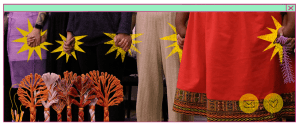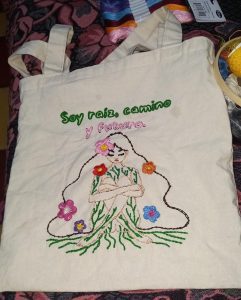
Little School for Feminist Climate Justice: A Model of Resistance from the Territories
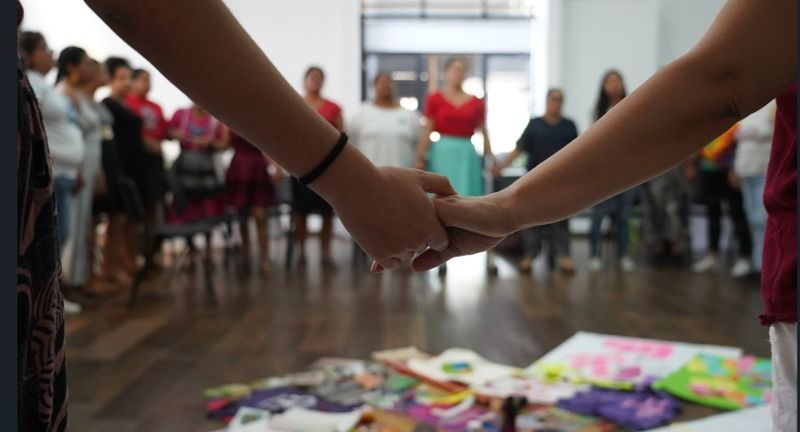
Table of Contents
- Extractivism threatens human rights in Latin America
- Defending the territory is defending life
- The Little School for Feminist Climate Justice is born
- Key strategies of the Little School
- Training to address the climate crisis
- Key issues that transform lives and territories
- Learnings that empower
- To care for our bodies is to care for the struggle
- A replicable model for climate justice
- Transformative results of the Little School for Feminist Climate Justice
- Impacts of extractivism according to the participants
- False solutions that perpetuate the problem
- Local solutions from the territories
- Voices from the territories
- Call to Action
Extractivism threatens human rights in Latin America
Extractivism is expanding at an ever-increasing rate across Latin America. This economic model dispossesses territories and violates people’s fundamental rights, forcing communities to face extreme pollution and turning vast swaths of land into “sacrificial zones” where the health of those that inhabit them deteriorates severely.
Extractive projects offer precarious jobs to men, while women face gender-based violence and exclusion. Sexual violence and femicide rise in these contexts, and women continue to be relegated to domestic tasks without recognition or protection.
In addition, many of these extractive projects violate the right to free, prior, and informed consent, which contradicts international human rights standards. Despite this, extractivism is legitimized through “greenwashing” discourses. These false solutions reinforce green colonialism and perpetuate dispossession.
Defending the territory is defending life
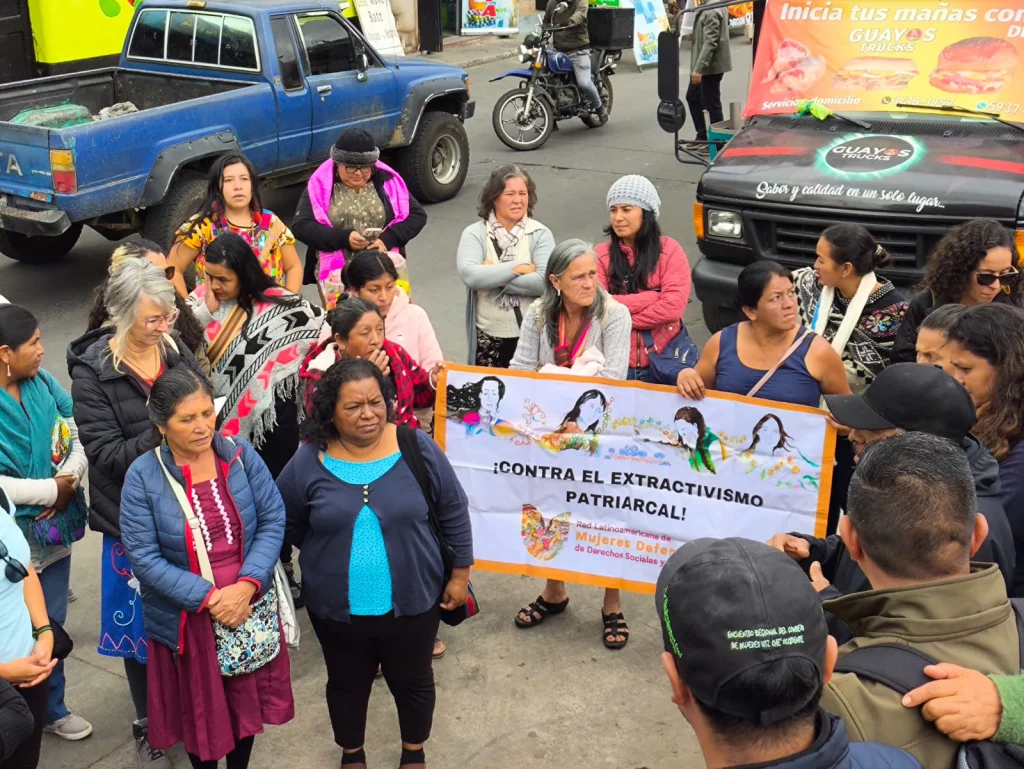
Faced with this reality, communities resist. The defense of their land becomes a struggle for life and human rights. Peasant women, Indigenous people, and residents of urban peripheries lead this resistance, and they face constant threats for protecting their lands.
Women play a central role as defenders, which results in them suffering gender-based injustices. Their bodies and lives are targets of violence, and they also face the silencing of their voices and exclusion from decision-making spaces. Indeed, they are often not recognized as leaders within their own organizations, limiting their participation and empowerment.
The Little School for Feminist Climate Justice is born
The Little School for Feminist Climate Justice emerged as an initiative by the Red Latinoamericana de Mujeres Defensoras de Derechos Sociales y Ambientales. Since 2021, with FCAM’s support, the Escuelita (little school) has been strengthening women environmental defenders. With the participation of organizations from El Salvador, Honduras, Mexico, and Nicaragua, this regional project promotes the protection of women defenders and fosters solutions based on climate justice and gender equity.
The Escuelita scales up training and safeguarding processes for local organizations, promoting mitigation and adaptation solutions from a perspective of socio-environmental preservation, equality, and climate justice.
Key strategies of the Little School

The Little School is based on four fundamental strategies:
- Support for local struggles and regional coordination. The Escuelitastrengthens networks between advocacy organizations in different countries.
- Recognition of shared experiences and needs. It highlights shared struggles, experiences, and impacts in the face of mining extractivism.
- Responding to unequal access to education. It offers training tailored to the realities of women defenders in response to the lack of information about the climate crisis.
- Creation of an ecofeminist space for collective learning. It promotes the horizontal exchange of knowledge, addressing specific training needs, since schools and universities fail to take their realities into account and reproduce discrimination.
These strategies emerged from a regional caravan; for three months, the Red traveled across Central America to listen to partner organizations, and women defenders share their struggles against mining. They also spoke about the impacts on their bodies, territories, and climates. As a result, the Red identified the need to train women defenders on the connection between the climate crisis, mining, and violence against women.
Training to address the climate crisis
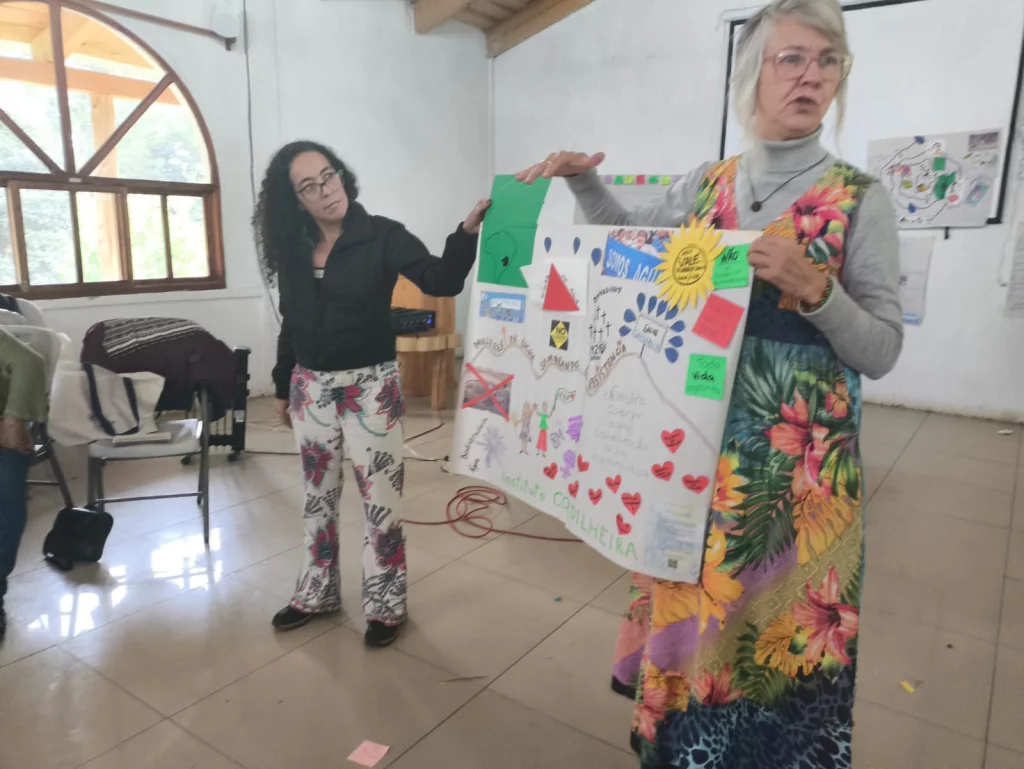
A common concern was the lack of information about the climate crisis, which limits the capacity for defense and adaptation. Schools and universities have ignored their realities and reproduced discrimination, so women defenders need tailored training.
The Escuelita responds to this gap: It offers content that connects the climate crisis with extractive and gender-based violence, and participants also learn about mitigation and adaptation while strengthening their capacities to influence their communities.
Key issues that transform lives and territories
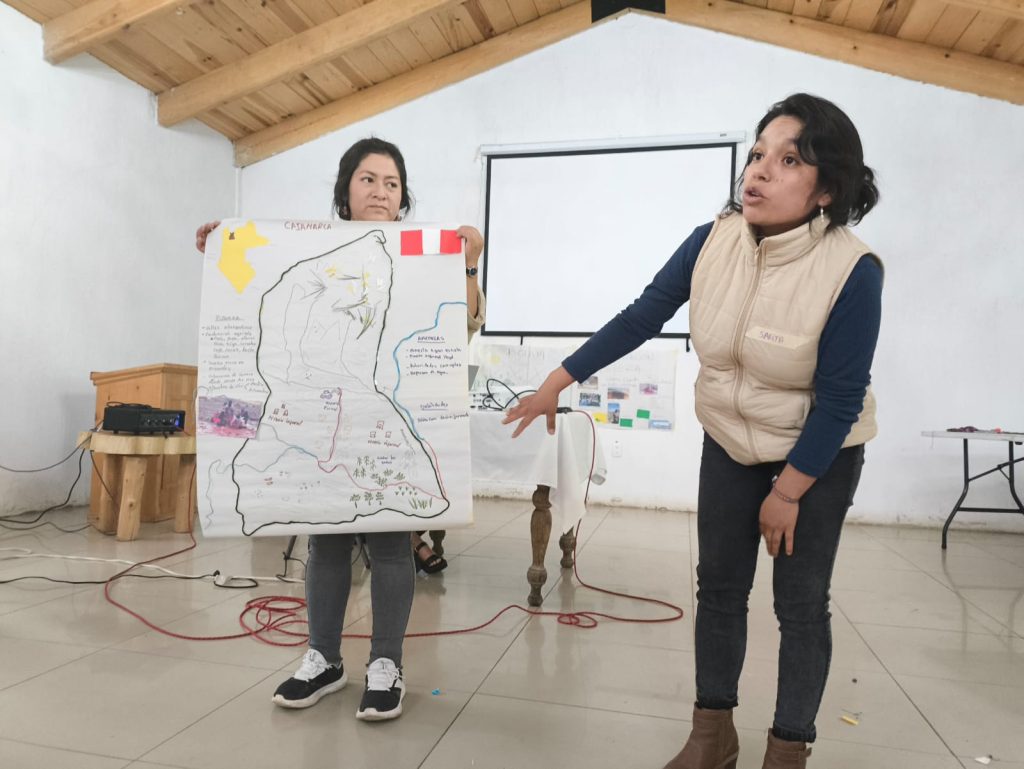
The workshops address urgent and strategic issues for women defenders:
- The Impacts of mining and climate change on women. Participantsanalyze the personal, territorial, and organizational consequences of mining and climate change.
- Safety and safeguarding protocols. They learn to protect themselves against threats and violence.
- Identifying false solutions. They sharpen their capacity to recognize misleading narratives that legitimize extractivism.
- Technology and community solutions. They work in environmental monitoring, land access and management, food sovereignty, agroecology, reforestation, water management, and low-emission energy generation.
- Strategic communication. They strengthen their capacity to raise awareness and make their struggles visible.
- International mechanisms. They become more familiar with forums like COP and other tools for defending human rights.
- Self-care, psychosocial support, and healing. They promote physical and emotional well-being, recognition of care work, and the creation of safe spaces for environmental work.
Learnings that empower
Some participants had never heard of the Conference of the Parties (COP). At the Escuelita, they learned about their relevance and how to influence these events.
“My colleagues and I didn’t know anything about COP; it was in this space that we learned and recognized the importance of these issues… I hope this process continues!” — Participant from Guatemala.
This kind of training transforms the way women defenders confront the climate crisis. It gives them the tools to act strategically and with knowledge.
To care for our bodies is to care for the struggle
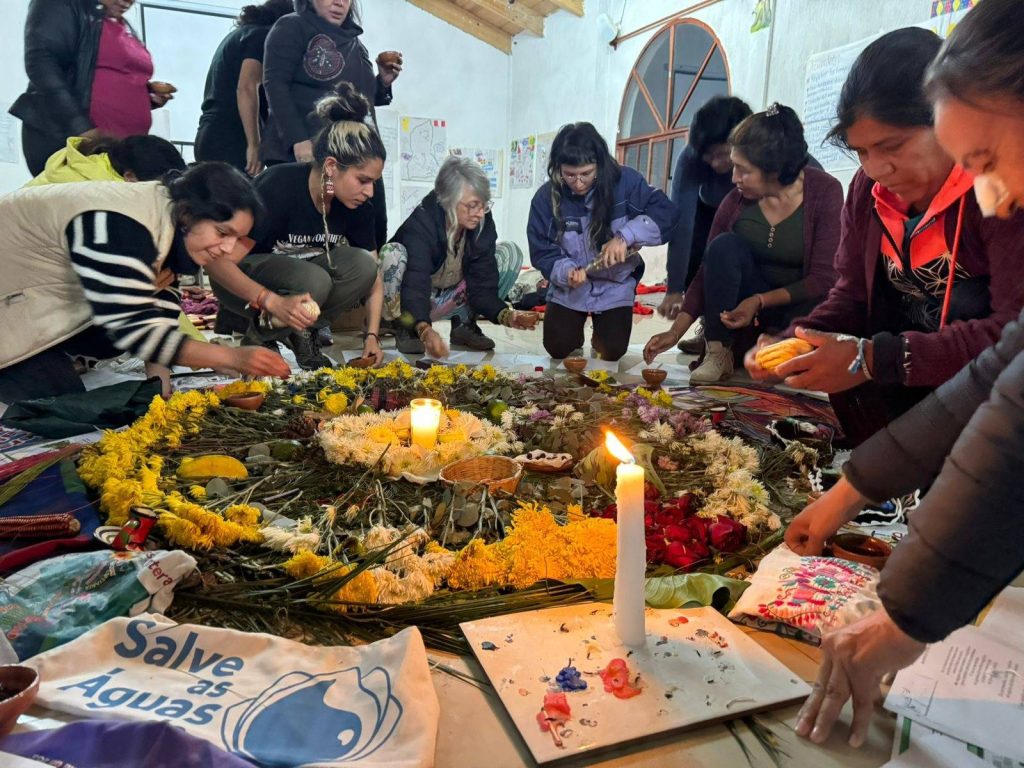
The Little School also addresses the physical and emotional strain women defenders face given that they often prioritize the struggle over themselves.
“Not all women have these tools… I would even dare to say that sometimes women defenders don’t have their own limits because socio-environmental struggles are exhausting.” — Project consultant.
Recognizing this reality is key. La Escuelita promotes self-care as part of the resistance because caring for our bodies is caring for the struggle.
A replicable model for climate justice
The Little School for Feminist Climate Justice is a replicable model. Its comprehensive approach responds to the real needs of women defenders and combines training, protection, healing, and regional coordination, all from a feminist, community, and environmental perspective.
This project is proof that climate justice is only possible with gender justice and that women defenders are key to transforming the present and the future.
Transformative results of the Little School for Feminist Climate Justice
The Little School has generated concrete impacts in the territories. Its actions strengthen adaptation and mitigation to the climate crisis from a feminist perspective.
1. Contributions to adaptation and mitigation
The Little School promotes the transfer of appropriate technologies. It also fosters the development of knowledge and practices for socio-environmental conservation.
Traditional communities have access to appropriate methods and standards, which improves their capacity to respond to the effects of climate change.
2. Diagnostics and knowledge generation
At the Little School, participants assess the impacts of climate change on multiple countries and analyze false solutions and violence against women and territories.
Women defenders also identify their knowledge and capacities, which enables the implementation of coordinated and effective solutions for the protection of land and environmental defenders.
3. Strengthening community monitoring
In El Salvador, equipment was purchased to allow communities to watch over their water. Rural communities are thus strengthening their territorial, environmental monitoring. This type of action consolidates local autonomy, and it allows for the detection and reporting of the impacts of extractivism.
Impacts of extractivism according to the participants
Women defenders have identified multiple negative outcomes as a result of the extractive model:
- Economic dependence on the global market. Selling is cheap while buying is expensive, increasing inequality.
- Devaluation of community economies. Models based on care and reciprocity are ignored.
- Overworked women. Housework and caregiving become more difficult.
- Increased violence and health problems. Women suffer harassment, persecution, intimidation, stress, hopelessness, malnutrition, cancer, and sterilization.
- Environmental pollution. It particularly affects women and girls as a consequence of gender roles.
False solutions that perpetuate the problem
Participants also identify practices that are presented as solutions, but actually exacerbate the crisis:
- Monoculture tree plantations. They degrade the soil and disrupt the natural balance.
- Carbon credits and climate offsets. They commodify nature without distributing benefits fairly.
- Smart agriculture. It intensifies the use of pesticides and toxic technologies.
- Lithium exploitation. It promotes individual solutions and excessive electrification, without challenging extractivism.
- Dams. They cause flooding and mass displacement.
Local solutions from the territories
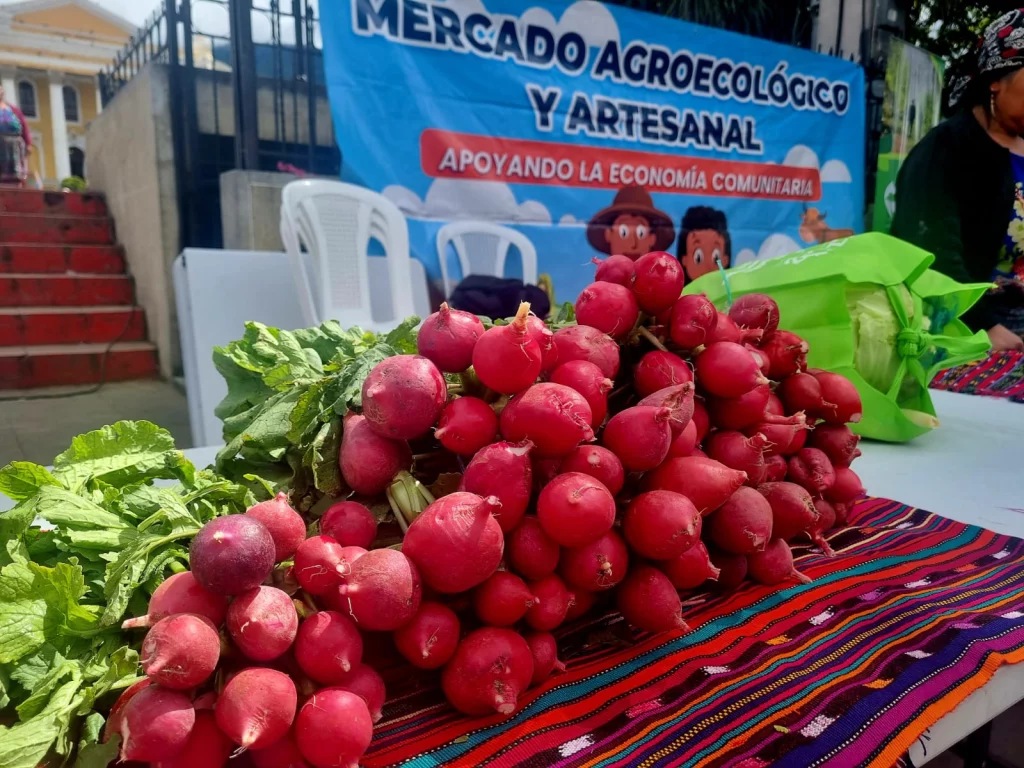
Women defenders propose sustainable and community-based alternatives:
- Agroecology and polyculture. Milpas, chacras, and crop associations that promote food sovereignty and regenerate the soil.
- Community energy. Locally managed solar panels that strengthen energy autonomy.
- Indigenous community management of natural resources. Water harvesting ensures supply in case of drought.
- Community economies. Sharing seeds and food strengthens local networks.
- Restoration and protection of the territories. Conservation areas such as native forests and glaciers are created.
Voices from the territories
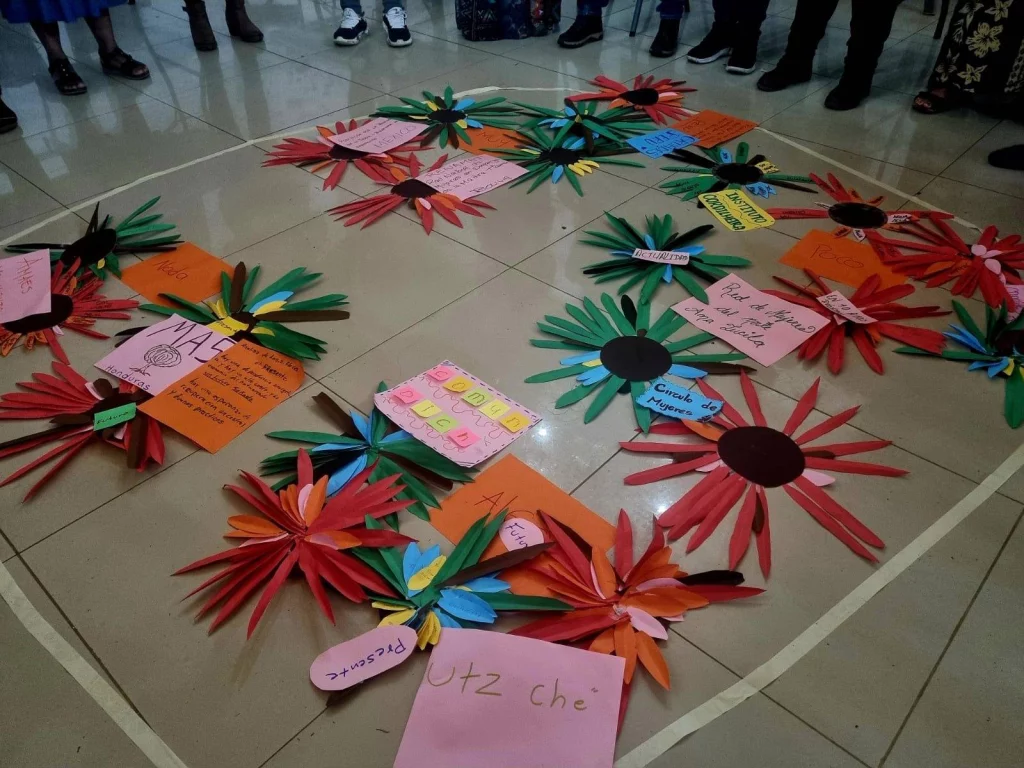
“At Lake Güija, we are experiencing a tragedy in El Salvador and Guatemala. Women have been terribly affected. Hundreds of fish were lost, handled by fisherwomen whose future and hope lay in those floating cages, and with the rain, they overflowed. The mine took advantage of the situation to empty its leachate. My compañeras have been financially and mentally affected.” — Participant from El Salvador
“Although the extractive model was previously a less industrialized practice with a smaller reach, it still boosted the economies of European countries thanks to colonization. Today, it’s part of the model. The colonialist system is being reinstated, and they’re taking away not only mineral and natural resources, but also our knowledge, ancestral heritage, culture, spirituality, and worldview. They impose a more modernized, dehumanized, less collective, and more individual model, and they operate within this logic. In all its dimensions, it threatens life and the wisdom of women.” — Participant from Honduras.
“I drew myself as part of my community. In my drawing, I included what has been damaged. I included a river that represents life; it had a flow.” — Participant from Honduras.
Call to Action
It’s time to act for gender, socio-environmental, and climate justice!
Women defenders are confronting extractivism, protecting their territories, and creating real solutions from their communities. The Little School for Feminist Climate Justice is more than an initiative: it’s a network of resistance, healing, and transformation.
You can be part of the change!
- Spread the word about this model. Let more people know about the struggles and solutions that emerge from the territories.
- Support women defenders. Help strengthen their capabilities, safety, and well-being.
- Incorporate gender, socio-environmental, and climate justice into your work, activism, or philanthropy. Every action counts.
There is no climate justice without gender justice!
There is no future without living territories!
Download:
Learn about the research “Small Investments with Big Impacts,” which contains the case study of the Little School for Feminist Climate Justice.

